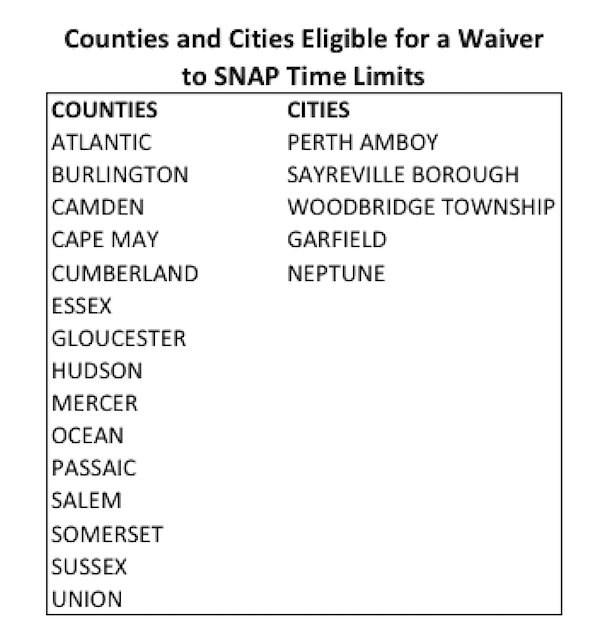The Christie administration has decided not to apply for a waiver that would have prevented the loss of SNAP (formerly know as the food stamp program) for many New Jerseyans living in high unemployment areas of the state because of their inability to secure full time employment. In effect, the poor are being punished for being poor.
On News Year Eve, the Christie administration announced that they could no longer continue the statewide waiver exempting about 11,000 “Able Bodied Adults without Dependents” (or ABAWDs in bureaucratic lingo) from what they said were work requirements. If a person doesn’t meet certain requirements for just three months they will now lose access to nutritional benefits for three years – an overly harsh penalty that will increase severe hunger in New Jersey.
In reality, this provision is not a work requirement but a time limit. Individuals who are looking for work or who work part-time (less than 20 hours a week) will still lose their SNAP. In addition, there is no requirement that jobs be available or even that the state provide training to avoid termination of SNAP. Work requirements in other public programs have always counted job search as a work activity and took into account the availability of jobs or training.
The state had a waiver for the last six years because of its high unemployment rate, and emphasized that the termination was a federal requirement and beyond New Jersey’s control. But that is only part of the story. What officials did not say is that New Jersey could still have received local waivers for areas with high unemployment – which applies to most of the state.
The state’s decision not to apply for local waivers is wrong and will harm many struggling New Jerseyans:
Submitting a waiver for areas of the state with high unemployment would avoid the SNAP time limit for most of these adults. Fifteen counties and five cities (see list below) would be eligible for a federal waiver, helping about 80 percent of the 11,000 folks who may lose benefits, or about 9,000 New Jerseyans.
The individuals subject to the SNAP time limit are the poorest of the poor. Nationally, the average income for individuals subject to the three-month time limit is 19 percent of the federal poverty level, or only $2,200 a year. About 40 percent are women, almost a third are 40 years old, and only half have a school degree or GED. Unfortunately many of them simply are not able to compete for scarce jobs in the open market.
The state will likely lose millions in federal SNAP funds. These 11,000 New Jersey residents receive about $21 million annually in SNAP, which is completely paid for by the federal government and generates $36 million in economic activity. Any substantial reduction in this amount as a result of these individuals losing SNAP will result in lost federal funds and harm local economies across the state.
The three-month time limit could result in many New Jerseyans being incorrectly kicked off SNAP. New Jersey officials will need to carefully monitor an individual’s work, training, and receipt of benefits over three year periods to determine if that person is still eligible for SNAP. In addition, the state must determine if these individuals are eligible for exceptions such as being pregnant, or having a disability or mental illness. New Jersey is well known for its poor administration of SNAP, which recently resulted in a threat from the federal government to withhold federal funds, so the prognosis for the state fully implementing these requirements is poor. It’s not hard to see an end result where many New Jerseyans are wrongly deemed ineligible and then fall through the cracks and become unable to retain this crucial food assistance.


